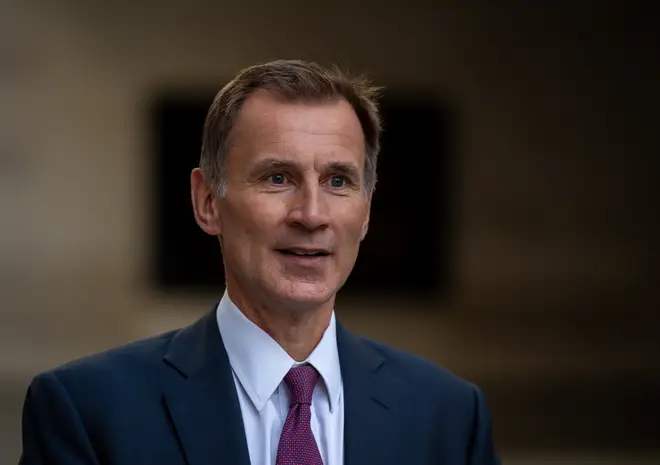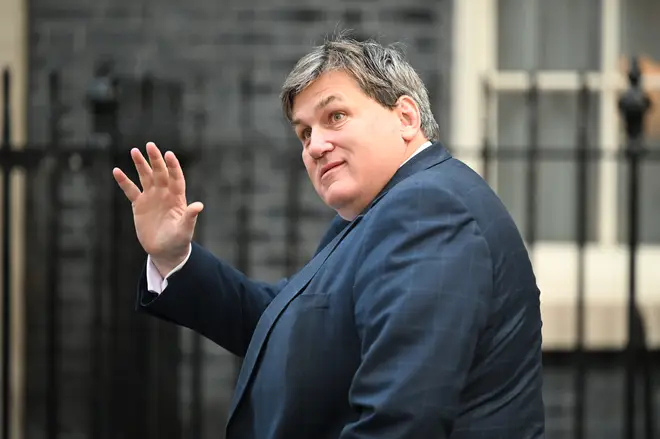
Shelagh Fogarty 1pm - 4pm
18 November 2022, 08:05

Nick Ferrari has blasted former Conservative minister Kit Malthouse for invoking the war in Ukraine when asked about the impact Thursday's mini-budget will have on national incomes.
Taxes are set to rise to the highest level since the Second World War after chancellor Jeremy Hunt's Autumn Statement, which include a total of £55 billion in tax rises and spending cuts.
And British people will suffer the biggest drop in disposable income since the 1950s, when records began, according to the Office for Budget Responsibility.

Nick Ferrari grills Tory MP after the mini-budget
Speaking to LBC's Nick Ferrari on Friday morning, former education minister Kit Malthouse admitted the figures look "grim" - but tried to put the UK's economic malaise in the context of the rise in energy prices since Russia invaded Ukraine in February.
"It is fair to say we are coping with an unprecedented set of international circumstances that have put us into a very difficult situation," Mr Malthouse said.
"Over the years, certainly in my lifetime, the Conservatives have proven to be the best custodian of the economy," he added.
Read more: 24-year-old 'struggling to make ends meet' on £34,000 salary amid cost of living crisis
Nick pushed back, pointing to the UK's anaemic growth since the Tories came to power in 2010 in the coalition government.
Mr Malthouse said: "It depends, if you’re in a storm, if you've got massive waves crashing over the bows, if we’ve got war in Europe, [after the] pandemic.
Nick interjected: "Please don’t blame Vladimir Putin Mr Malthouse! Stop that, you’re a very smart, very wise bloke, stop blaming Vladimir Putin for 12 years of Tory misrule."

'It is grim!' Tory MP reacts to mini-budget
Mr Malthouse said he was "not necessarily blaming him" but added that "there are ripples coming out of that awful war in the UK that are affecting not just the UK but the whole world, not least the energy price shock that we’re having to deal with."
The MP for North-West Hampshire said: "Would I have devised this set of solutions? I’m not sure necessarily I would. But Jeremy is privy to more information than I am."
Mr Malthouse said that the "need for growth is still very strong", adding that the "key message" of former PM Liz Truss and her chancellor Kwasi Kwarteng's disastrous plan to cut £30 billion taxes was stimulating growth.

He added that it is now "fashionable to decry" Ms Truss and Mr Kwarteng.
Mr Malthouse said: "We’re not going to tax our way out of this international logjam of finance. That we have to get growth into the economy - that was critical."
But citing Friday's leader column in the Financial Times, Nick said: "where the statement was badly lacking was in plans to boost potential growth."
The impact of the Autumn Statement will be spread out over the next few years.

The £25bn in tax rises set out by Mr Hunt will enter force in 2023 while £30bn in spending cuts has been put off until the next election. Labour has warned of a "doom loop" in the economy over the high tax levels.
British people's incomes will fall by 7.1% from 2021-22 to 2022-23 on average, which means incomes will be where they were in 2013, according to the Office for Budget Responsibility (OBR), which also said the UK was now in recession.
Real household disposable incomes per person will tumble by 4.3% in 2022-23, the OBR said. That will be the steepest drop since official records began in 1956-57.
Compounding the pain, that will be followed the very next year by the second largest fall, at 2.8%.It will be only the third time since 1956-57 that disposable incomes fall two years in a row. The last time was after the financial crisis of 2008.